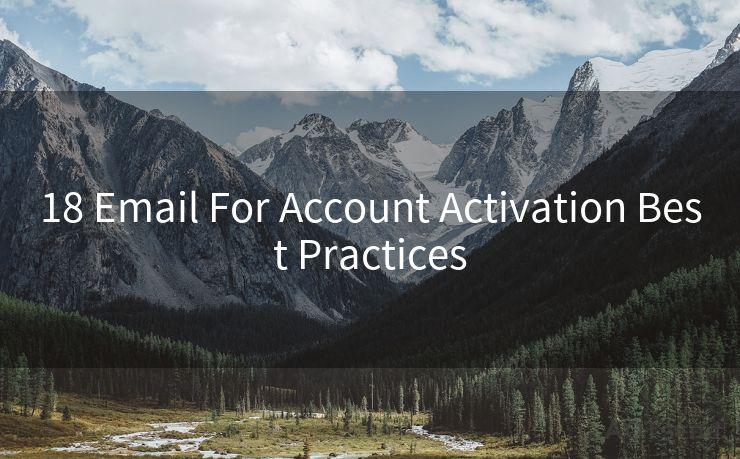18 Email For Account Activation Best Practices




When it comes to account activation via email, following best practices is crucial to ensure a smooth user experience and maintain the security of your platform. Here are 18 best practices for account activation emails that you should follow:
1. Clear and Concise Subject Line
The subject line of your activation email should be clear and to the point, indicating the purpose of the email. For example, "Activate Your New Account" or "Complete Your Account Activation".
2. Personalized Greeting
Start the email with a personalized greeting, using the user's name if possible. This adds a personal touch and makes the email more engaging.
3. Explanation of the Email's Purpose
Briefly explain why the user is receiving this email. Mention that they have recently created an account and this email is to activate it.
4. Prominent Activation Link
The activation link should be prominent and easy to find in the email. Use a button or a clearly marked link to make it stand out.
5. Instructions and Guidance
Provide clear instructions on how to use the activation link. Keep the language simple and direct.
6. Expiration Time for the Link
Inform users that the activation link will expire after a certain period of time (e.g., 24 hours) for security reasons.
7. Security Reminders
Include a reminder for users to keep their account information secure and not to share the activation link with anyone.
8. Contact Information
Provide contact information or a helpdesk link in case users encounter any issues during the activation process.
9. Responsive Design
Ensure the email is mobile-friendly, as many users check their emails on mobile devices.
10. Privacy Policy Link
Include a link to your privacy policy to assure users that their data is being handled securely.
🔔🔔🔔
【AOTsend Email API】:AOTsend is a Managed Email Service for sending transactional emails. Support Email Types: reminders, authentication, confirmations, notifications, verification codes, invoices, password resets, account activations, billing statements, two-factor authentication (2FA), and one-time passwords (OTP) emails, etc. $0.28 per 1000 Emails. 99% Delivery, 98% Inbox Rate.
You might be interested in:
Why did we start the AOTsend project, Brand Story?
What is a Managed Email API, How it Works?
Best 25+ Email Marketing Platforms (Authority,Keywords&Traffic Comparison)
Best 24+ Email Marketing Service (Price, Pros&Cons Comparison)
Email APIs vs SMTP: How they Works, Any Difference?
11. Unsubscribe Option
Always include an unsubscribe link, as required by many email marketing regulations.
12. Branding Consistency
Maintain branding consistency in the email design, logo, and color scheme to reinforce your brand identity.
13. Call to Action
Encourage users to activate their account promptly with a strong call to action.

14. Avoid Spam Filters
Use clean and simple HTML code to avoid spam filters, and ensure deliverability.
15. Test Email Deliverability
Test the email across multiple email providers to ensure it reaches users' inboxes.
16. A/B Testing
Consider A/B testing different versions of the activation email to see which one performs better.
17. Follow-Up Email
If a user hasn't activated their account after a certain period, send a follow-up email as a reminder.
18. Monitor and Iterate
Continuously monitor the performance of your activation emails and iterate based on user feedback and analytics data.
By following these 18 best practices, you can ensure that your account activation emails are effective, user-friendly, and secure. Remember to always prioritize the user experience and make the activation process as smooth as possible.




Scan the QR code to access on your mobile device.
Copyright notice: This article is published by AotSend. Reproduction requires attribution.
Article Link:https://www.mailwot.com/p3359.html



